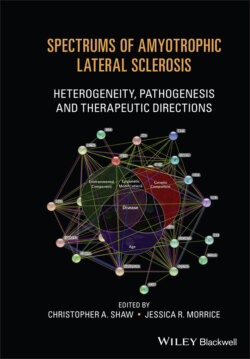Читать книгу Spectrums of Amyotrophic Lateral Sclerosis - Группа авторов - Страница 27
INTRODUCTION
ОглавлениеThe recent study of amyotrophic lateral sclerosis (ALS) has generally been driven by its associated genes. While there seems to be a strong environmental component to ALS risk, the heritability of ALS has been estimated to range between 0.523 and 0.61 [1, 2] which suggests a substantial genetic contribution. As the number of cases currently explained by known genetics variants is relatively small, there are likely many genetic contributors yet to be discovered. Further complicating ALS genetics is the distinction between familial and sporadic cases: those with a family history of ALS or frontotemporal dementia, and those without, respectively.
One of the first goals of ALS genetic research has been to identify variants in genes and to fit these genes into our current understanding of ALS biology. Over the years, various methods of gene discovery have been applied. Over time, studies focused on familial linkage, as well as screening of candidate genes encoding a protein with known biological relevance, were replaced by whole‐exome (WES) and whole‐genome sequencing (WGS) studies; such advances have led to the identification of variants more frequently observed in ALS patients than unaffected individuals.
This chapter will review genes for which there is consistent strong evidence and genes that were recently discovered, explore aspects of inheritance for ALS‐associated variants, and consider regulatory and epigenetic variants.
